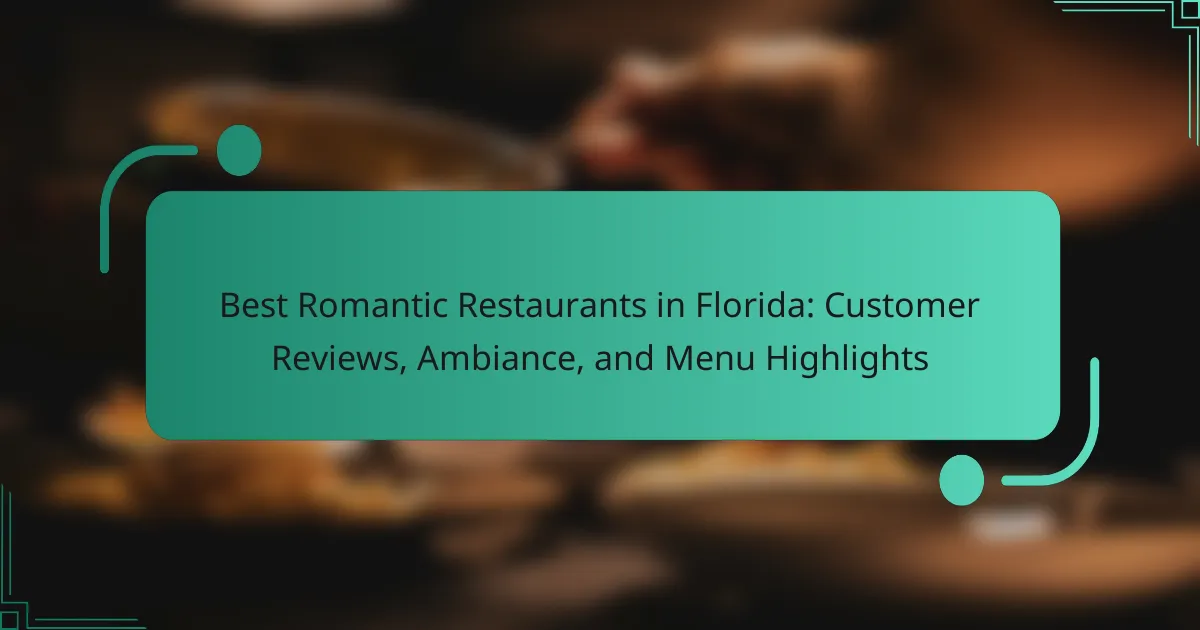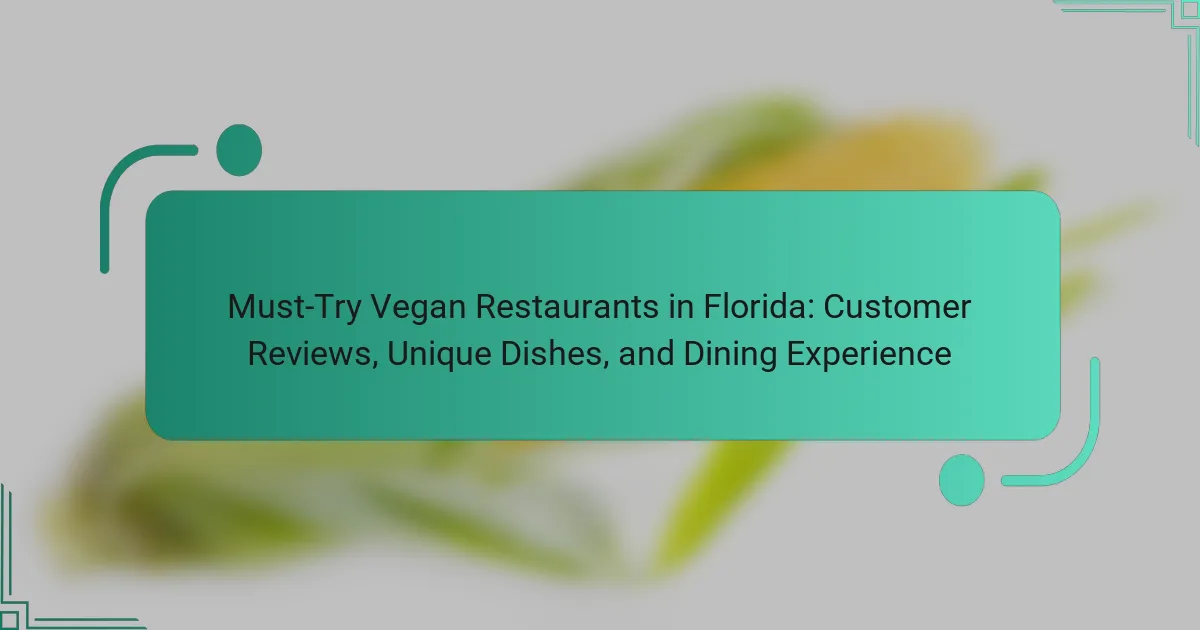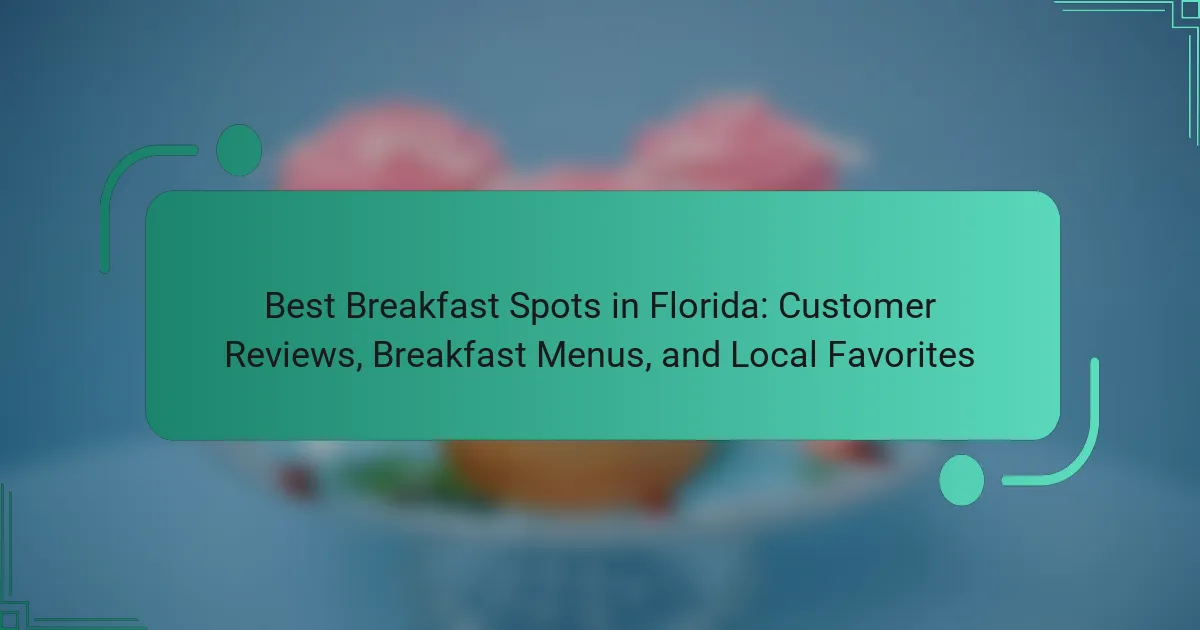The article focuses on popular food trucks in Florida, highlighting notable entities such as The Grilled Cheese Truck, Curbside Gourmet, and Ms. Cheezious. It discusses the unique offerings of these food trucks, including gourmet grilled cheese sandwiches and diverse global cuisine, as well as their high customer ratings and frequent appearances at events and festivals. The article also explores the various locations where food trucks operate, including urban areas, parks, and popular events like food festivals. Emerging trends in Florida’s food truck industry, such as gourmet dining experiences, plant-based options, and the use of mobile technology for customer convenience, are examined. Additionally, the article addresses the importance of sustainability and collaborations with local businesses in enhancing community engagement and supporting the local economy.
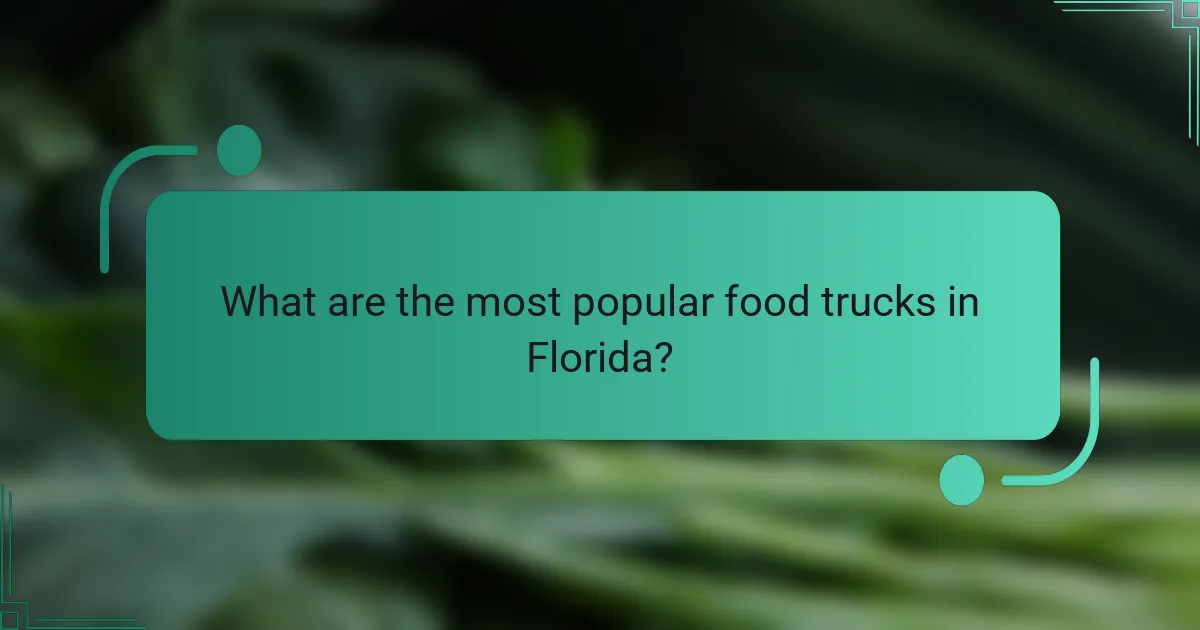
What are the most popular food trucks in Florida?
The most popular food trucks in Florida include The Grilled Cheese Truck, Curbside Gourmet, and Ms. Cheezious. The Grilled Cheese Truck specializes in gourmet grilled cheese sandwiches. Curbside Gourmet offers a diverse menu featuring global cuisine. Ms. Cheezious is known for its creative takes on classic grilled cheese. These food trucks have received high ratings and positive customer reviews. They are frequently found at events and festivals across the state. Their popularity is attributed to unique offerings and quality food.
How do customer reviews influence the popularity of food trucks?
Customer reviews significantly influence the popularity of food trucks. Positive reviews enhance a food truck’s reputation and attract more customers. High ratings can lead to increased foot traffic. Many consumers rely on online reviews to make dining decisions. A study by BrightLocal found that 84% of people trust online reviews as much as personal recommendations. Negative reviews can deter potential customers and harm a food truck’s image. Food trucks with consistent positive feedback often experience higher sales. Social media also amplifies the impact of customer reviews, reaching wider audiences. Overall, customer reviews are crucial for building trust and driving popularity.
What do customers typically praise in their reviews?
Customers typically praise the quality of food from food trucks in Florida. Many reviews highlight fresh ingredients and unique flavors. Customers often mention the friendly service provided by the food truck staff. The convenience of food trucks at various locations is frequently appreciated. Value for money is another common point of praise. Customers also enjoy the variety of menu options available. Positive reviews often emphasize the cleanliness of the food trucks. Overall, customer satisfaction is reflected in the consistently high ratings across various platforms.
What common complaints do customers have about food trucks?
Common complaints customers have about food trucks include long wait times, inconsistent food quality, and limited menu options. Customers often express frustration when food trucks are slow to serve during peak hours. Inconsistent food quality can lead to disappointment if a dish does not match previous experiences. Additionally, some food trucks offer a limited menu, which may not cater to all dietary preferences. High prices compared to restaurants are another frequent concern. Customers also mention issues with cleanliness and food safety. These complaints highlight areas where food trucks can improve to enhance customer satisfaction.
What unique offerings do Florida food trucks provide?
Florida food trucks offer a diverse range of unique culinary experiences. They provide fusion dishes that blend various cultural flavors, such as Latin-Asian tacos. Many trucks focus on fresh, locally sourced ingredients, showcasing Florida’s agricultural bounty. Seafood is a prominent feature, with offerings like shrimp po’boys and fish tacos. Vegetarian and vegan options are also prevalent, catering to diverse dietary preferences. Specialty desserts, such as gourmet ice creams and tropical fruit bowls, add to the variety. Seasonal menus often highlight local festivals and events, creating a dynamic dining experience. These unique offerings reflect Florida’s multicultural landscape and culinary creativity.
How do food trucks differentiate themselves in menu offerings?
Food trucks differentiate themselves in menu offerings by focusing on unique culinary themes. They often specialize in specific cuisines, such as Mexican, Asian, or gourmet burgers. This specialization attracts customers looking for particular flavors. Many food trucks also incorporate local ingredients, enhancing freshness and supporting local agriculture. Seasonal menus are common, allowing trucks to offer dishes that reflect current food trends. Additionally, some food trucks create fusion dishes, blending different culinary traditions for innovative options. Customer engagement through social media helps them gauge preferences and adjust offerings accordingly. This adaptability is crucial in a competitive market. Overall, these strategies help food trucks stand out and cater to diverse customer tastes.
What are some signature dishes from popular food trucks?
Some signature dishes from popular food trucks include gourmet tacos, loaded fries, and artisanal sandwiches. Gourmet tacos often feature unique fillings like Korean BBQ or fish ceviche. Loaded fries may be topped with cheese, bacon, and various sauces. Artisanal sandwiches can include fresh ingredients and creative combinations, such as pulled pork with coleslaw. Other notable dishes include gourmet burgers and specialty desserts like gourmet cupcakes. These offerings reflect the diverse culinary trends found in Florida’s food truck scene.
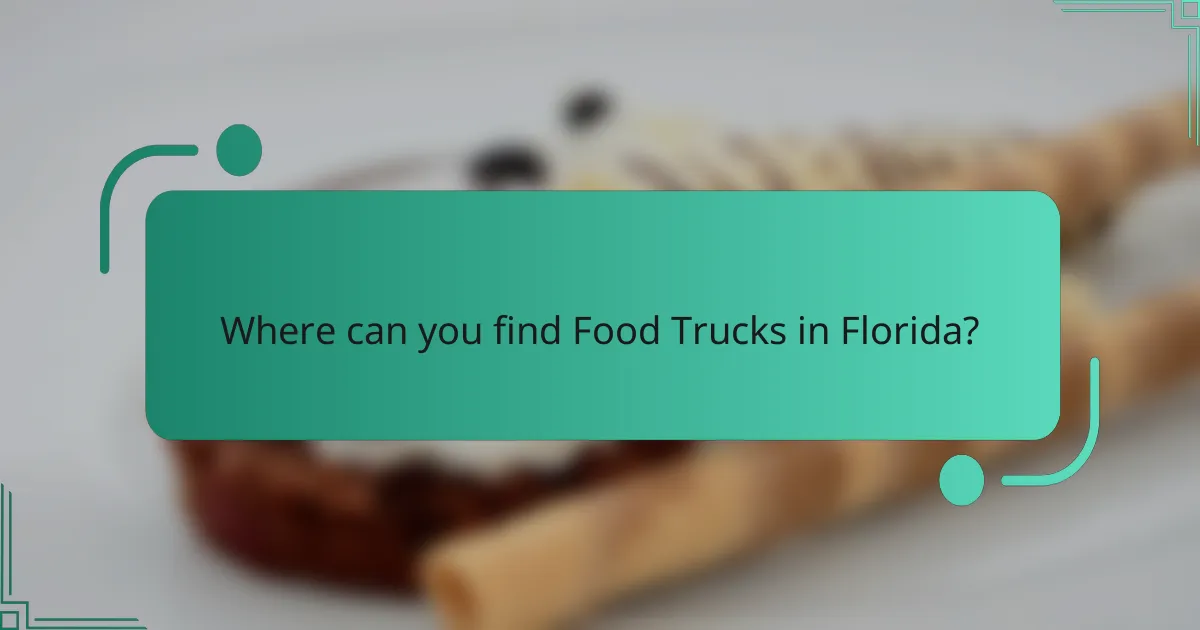
Where can you find food trucks in Florida?
Food trucks in Florida can be found in various locations, including urban areas, events, and parks. Cities like Miami, Orlando, and Tampa host numerous food trucks. Popular events such as food festivals and farmers’ markets frequently feature food trucks. Local parks and beaches often have food trucks parked for visitors. Additionally, many food trucks use social media to announce their locations. This allows customers to track them in real-time. Food truck gatherings are also organized in many neighborhoods. These gatherings provide opportunities for multiple food trucks to serve customers in one place.
What are the best locations for food trucks in Florida?
The best locations for food trucks in Florida include Miami, Orlando, and Tampa. Miami’s vibrant food scene attracts many food trucks, especially in areas like Wynwood and South Beach. Orlando’s popular spots include the Milk District and Lake Eola Park, where foot traffic is high. Tampa features food trucks in downtown areas and at events like the Tampa Bay Food Truck Rally. These locations consistently draw crowds, offering diverse culinary options and unique experiences.
How do food truck festivals contribute to their visibility?
Food truck festivals enhance visibility through increased foot traffic and media coverage. These events attract large crowds, providing food trucks with direct access to potential customers. Festivals often feature marketing efforts that promote participating trucks, amplifying their reach. Social media buzz generated during these events further elevates their profiles. Additionally, food truck festivals create opportunities for networking among vendors and local businesses. This collaboration can lead to partnerships that boost visibility beyond the festival. Overall, food truck festivals serve as a platform for brand exposure and customer engagement.
What are some popular neighborhoods known for food trucks?
Popular neighborhoods known for food trucks include Wynwood in Miami, the Arts District in Orlando, and Downtown St. Petersburg. Wynwood features a vibrant street art scene and numerous food trucks offering diverse cuisines. The Arts District in Orlando hosts food truck events regularly, attracting locals and visitors alike. Downtown St. Petersburg is home to food truck rallies, providing a variety of options in a lively atmosphere. These neighborhoods are recognized for their culinary creativity and community engagement through food trucks.
How do food trucks operate in Florida’s culinary scene?
Food trucks in Florida operate by providing diverse culinary options to customers in various locations. They often serve unique and innovative dishes that reflect local flavors. Food trucks typically set up in high-traffic areas, such as parks, festivals, and events. Many food trucks in Florida are required to obtain specific permits and licenses to operate legally. The Florida Department of Business and Professional Regulation oversees food truck regulations. Additionally, food trucks often utilize social media to announce their locations and menu offerings. This helps them engage with customers and build a loyal following. Food trucks contribute significantly to Florida’s culinary scene by promoting local ingredients and fostering a vibrant food culture.
What regulations must food trucks comply with in Florida?
Food trucks in Florida must comply with several regulations. They are required to obtain a mobile food vendor license from the Florida Department of Business and Professional Regulation. Food trucks must also register with the local health department and pass health inspections. Additionally, they must adhere to zoning laws specific to the areas they operate in. Food trucks need to have proper permits for food preparation and storage. Compliance with fire safety regulations is mandatory, including having fire extinguishers on board. They must also follow state laws regarding food safety and sanitation. These regulations ensure the safety and legality of food truck operations in Florida.
How do food trucks adapt to seasonal changes in Florida?
Food trucks in Florida adapt to seasonal changes by modifying their menus and locations. During the warmer months, they often feature lighter, refreshing dishes. This includes salads, seafood, and tropical fruits. In contrast, cooler months see an increase in hearty options like soups and stews.
Food trucks also adjust their operating hours based on seasonal foot traffic. They may open earlier or close later during peak tourist seasons. Additionally, they often participate in seasonal festivals and events to attract customers.
The Florida climate influences food truck operations significantly. For instance, summer storms may lead to a temporary halt in service. Food trucks also utilize social media to communicate changes in location or menu. This allows them to stay connected with their customer base throughout the year.

What trends are emerging in Florida’s food truck industry?
Florida’s food truck industry is experiencing several emerging trends. One significant trend is the rise of gourmet food trucks offering upscale dining experiences. These trucks often feature unique, high-quality ingredients and innovative dishes. Another trend is the increasing popularity of plant-based and vegan options. Many food trucks are adapting their menus to cater to health-conscious consumers.
Mobile technology is also influencing the industry. Food trucks are utilizing apps for ordering and tracking. This enhances customer convenience and improves service efficiency. Sustainability is becoming a priority as well. Many food trucks are focusing on eco-friendly practices, such as using biodegradable packaging.
Collaboration with local businesses is another trend. Food trucks are partnering with local breweries and farms to source ingredients and expand their customer base. This fosters community engagement and supports the local economy. Overall, these trends reflect a dynamic and evolving food truck landscape in Florida.
How is technology impacting food truck operations?
Technology is significantly impacting food truck operations by enhancing efficiency and customer engagement. Mobile apps streamline ordering and payment processes, reducing wait times for customers. GPS technology enables food trucks to optimize routes and track their locations in real-time. Social media platforms help food trucks promote their locations and menu offerings effectively. Point of Sale (POS) systems facilitate quicker transactions and better inventory management. Data analytics allows food truck operators to understand customer preferences and adjust menus accordingly. According to a survey by Food Truck Nation, 78% of food truck owners reported increased sales due to technology adoption. Overall, technology is transforming food truck operations by improving service speed, operational efficiency, and customer satisfaction.
What role do social media and apps play in food truck success?
Social media and apps are crucial for food truck success. They enhance visibility and engagement with customers. Platforms like Instagram and Facebook allow food trucks to showcase their menu and daily locations. This real-time interaction keeps customers informed about specials and events. Apps can facilitate online ordering and payments, streamlining the customer experience. According to a survey by the National Restaurant Association, 70% of consumers are influenced by social media when choosing dining options. This demonstrates the significant impact of digital presence on attracting customers.
How are food trucks embracing sustainability practices?
Food trucks are embracing sustainability practices by implementing eco-friendly operations. Many food trucks use biodegradable packaging to reduce plastic waste. They often source ingredients locally to minimize their carbon footprint. Some trucks utilize solar panels to power their equipment. Others focus on reducing food waste through careful inventory management. Many also recycle cooking oil for biodiesel production. These practices highlight a growing trend towards environmentally conscious food service. Studies show that sustainable practices can attract more customers and enhance brand loyalty.
What tips can customers follow to enhance their food truck experience?
Customers can enhance their food truck experience by arriving early to avoid long lines. Many food trucks have limited hours and popular items can sell out quickly. Checking social media for daily menus and locations is also beneficial. This allows customers to choose their preferred food options and avoid disappointment. Bringing cash can expedite the payment process, as some trucks may not accept cards. Being open to trying new dishes can lead to discovering unique flavors. Engaging with the staff can provide insights into menu items and specials. Lastly, enjoying food at nearby parks or communal seating areas can enhance the overall experience.
The main entity of this article is popular food trucks in Florida. It provides an overview of the most sought-after food trucks, including The Grilled Cheese Truck, Curbside Gourmet, and Ms. Cheezious, highlighting their unique offerings and customer reviews. The article examines how customer feedback influences food truck popularity, common praises and complaints, and the diverse culinary experiences these trucks provide. Additionally, it discusses the best locations for food trucks, emerging industry trends, and the role of technology and sustainability in their operations. Overall, the article serves as a comprehensive guide to understanding the vibrant food truck scene in Florida.

